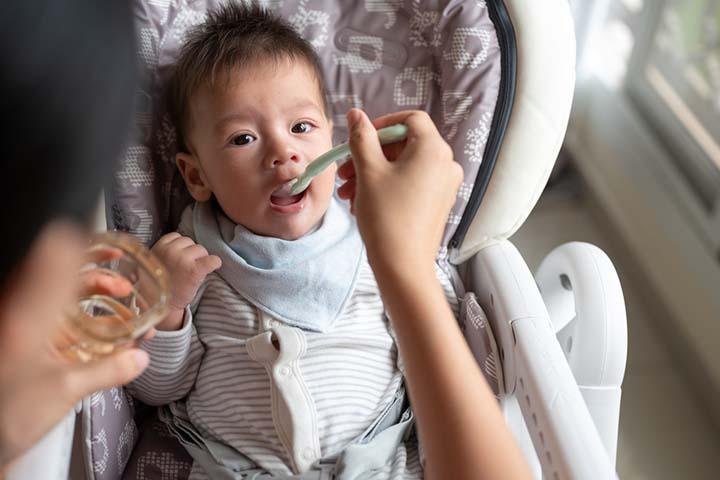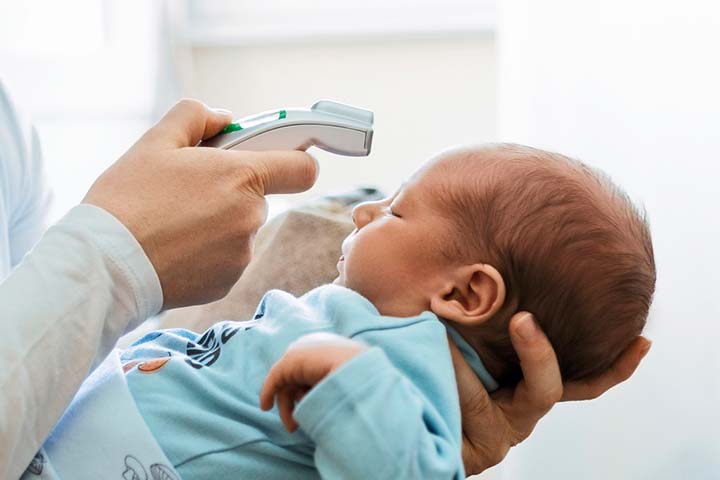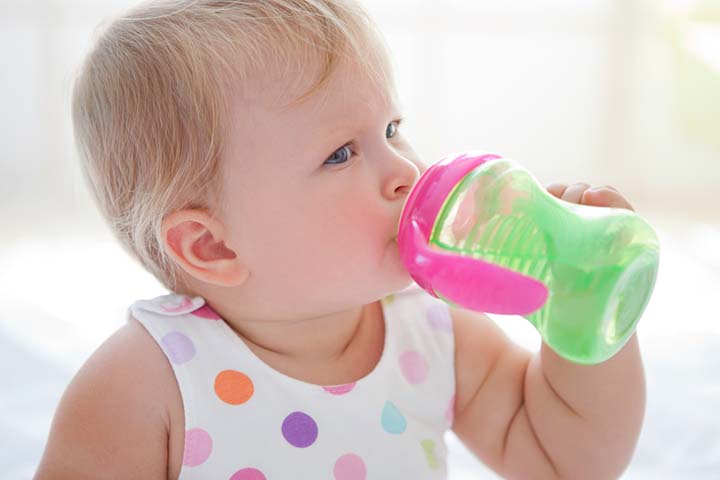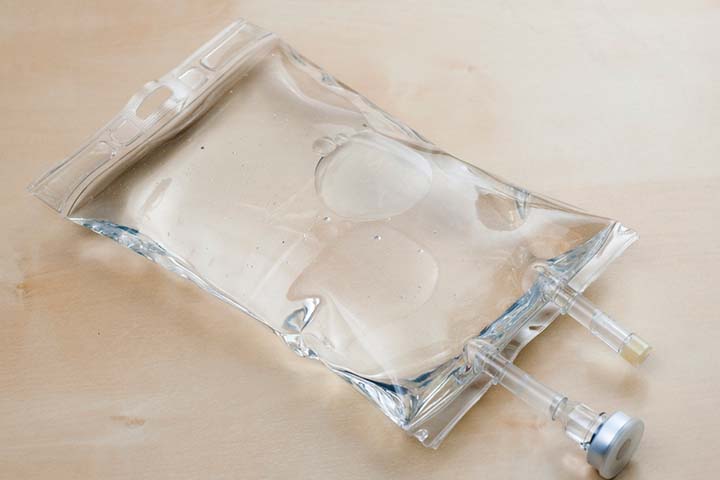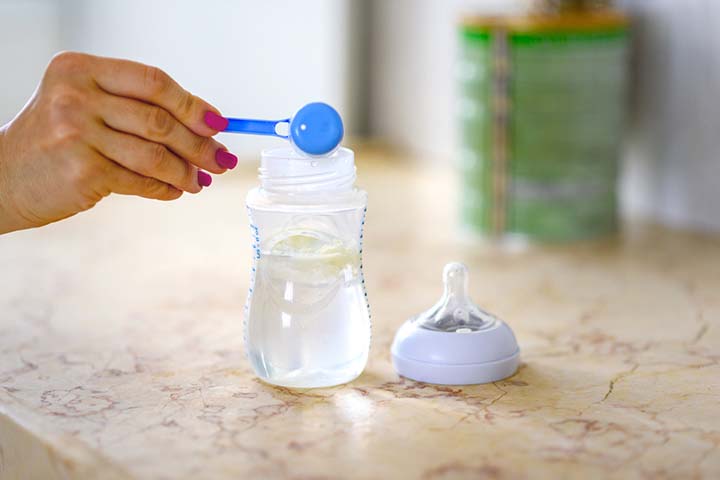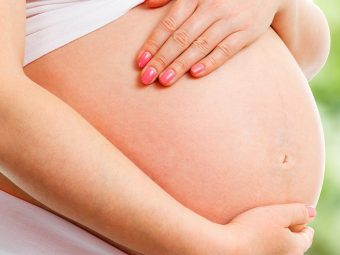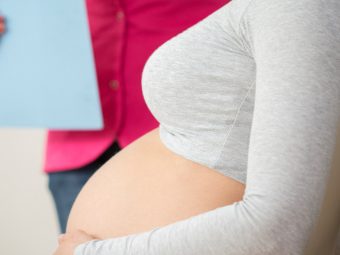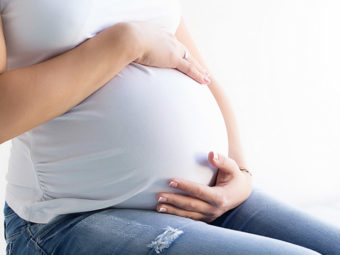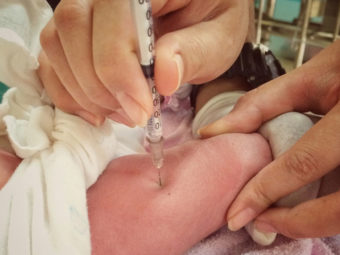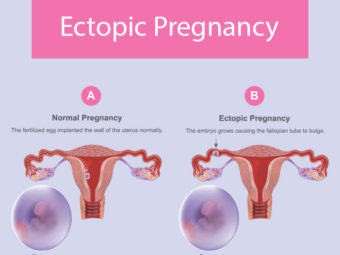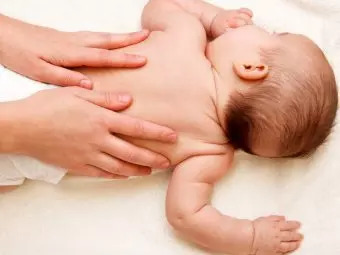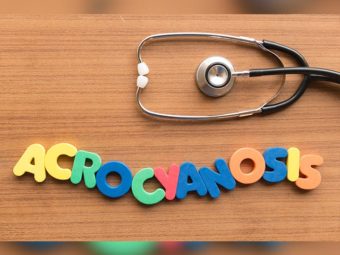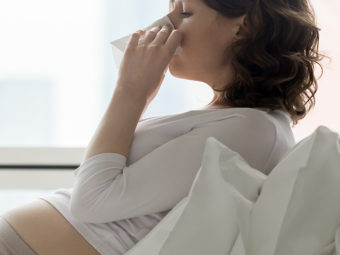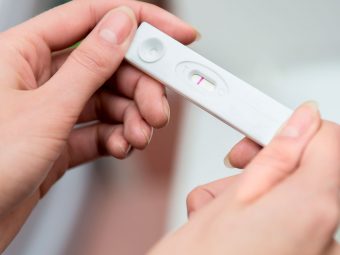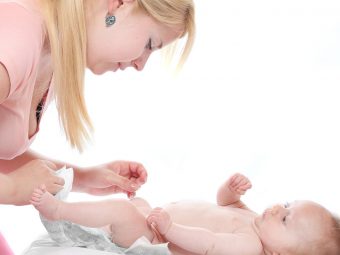
Image: Shutterstock
Water intoxication in babies is a condition that may cause severe physiological changes, such as low body temperatures and seizures. Feeding more water than the baby’s body can handle may upset the electrolyte balance of their system, leading to water intoxication.
Just like for adults, water is a vital nutrient for babies too. It is, thus, essential to fulfil their limited yet crucial water needs. Although water intoxication in babies is rare, it may be caused by overconsumption of water through excessively diluted formula or plain water given instead of ORS during diarrhea.
Read this post to learn more about the symptoms, possible causes, effects, and preventive measures for water intoxication in babies.
How Much Water Should Babies Have?
Image: Shutterstock
Babies under six months of age should not drink water. Their hydration requirements at this age are optimally met by breast milk and formula. Thus, feeding them water can put them at a higher risk of water intoxication. From six months to 12 months, you can offer 0.5 to 1 cup (4 to 8oz. per day) of water to your baby each day if needed (1).
The recommended water quantity and breastfeeding or formula-feeding are sufficient to meet the infant’s hydration requirements. However, in some instances, such as hot weather and sickness, sipping extra water shouldn’t be a problem. Nonetheless, be cautious not to make it a habit.
Symptoms Of Water Intoxication In Babies
Excess water in the body causes hyponatremia, where the body’s sodium levels fall abnormally low. It could affect the functions of several organs, including the brain.
Below are some of the common signs and symptoms of hyponatremia in babies (2) (3).
- Unusually clear urine
- Dizziness and lethargy
- Irritability and fussiness in the otherwise happy baby
- Low body temperature (hypothermia) of less than 97°F (36°C)
Image: IStock
- Nausea and vomiting
- Swelling of the extremities, i.e., arms, legs, and face
- Irregular breathing
- Fits if sodium levels fall too low
In extreme cases, water intoxication may lead to seizures and coma. If you observe any of these symptoms in your baby, consult a pediatrician.
 Be watchful
Be watchfulCauses Of Water Intoxication In Babies
Babies don’t consume water voluntarily. Thus, water intoxication occurs when babies are fed excess water by caretakers in the following ways.
- Feeding water and diluted juices: Babies up to six months of age don’t require water. Their hydration needs are optimally met with exclusive breastfeeding or formula feeding. However, some parents may begin feeding water and diluted juices to their babies to keep them hydrated and offer nutrition. It is not suitable for the little one since their kidneys are immature to process water.
- Feeding excessively diluted formula: Different formula brands require different amounts of water for preparation. Experts advise parents to follow the instructions on the package and use the mixing ratio as mentioned. It is crucial as using less water than mentioned can make the formula too thick, which may lead to constipation in babies. On the other hand, using too much water can dilute the formula, disturbing the electrolyte balance and nutritional intake, increasing the risk of water intoxication (4)(5) (6).
- Feeding from a cup: Experts advise phasing out bottle use for babies between 12 and 24 months (7). Thus, babies begin sipping water from cups, causing them to gulp excess water when unmonitored.
Image: IStock
Treatment For Water Intoxication In Babies
Water intoxication in babies is a state you can’t treat at home. Therefore, if your baby shows excessive water intake symptoms, taking your baby to the doctor is advisable. Depending on the severity of the symptoms, the doctor will chart a treatment plan to restore the body’s electrolyte balance and resolve symptoms.
In most cases, restricting the baby’s water intake and letting extra water exit the body through urination will resolve the condition. However, in severe cases, the doctor may recommend diuretics and the restoration of sodium levels through an intravenous saline drip.
 Quick tip
Quick tipTips To Prevent Water Intoxication In Babies
Image: IStock
Here are some simple tips to ensure your baby consumes water appropriately and in the right amounts.
- Don’t give water to babies under six months of age. Babies older than six months can have four to eight ounces (0.5 to 1 cup/day) of water each day.
- Speak to a pediatrician to learn how to determine if your baby is dehydrated and whether you must serve them water. Even in hot weather, infants may not require water, and frequent breastfeeding could be sufficient.
- Never overdilute the formula. You must follow the mixing ratio directed on the formula’s package.
Image: IStock
- Never leave the baby unattended when they are sipping water from the cup and while they are bathing. Leaving a baby unmonitored could cause accidental ingestion of excess water.
 Be watchful
Be watchfulWater intoxication in babies occurs when there is an excess amount of water in a baby’s body. Since breastfeeding provides adequate hydration, babies younger than six months do not require additional water. A daily intake of 0.5 to 1 cup of water is needed for six to twelve months of babies, and this may vary slightly depending on climatic conditions. When the water levels are high, it causes low sodium levels in the body and affects organ functioning, including the brain. Water intoxication can lead to seizures and coma at extreme levels. Parents or caregivers should follow pediatricians’ recommendations to feed water for babies.
Frequently Asked Questions
1. Are there any tests to diagnose water intoxication in babies?
Several etiologies can cause water toxicity, which is challenging to diagnose for their vague symptoms, such as altered mental status, disorientation, confusion, nausea, and vomiting. In addition, it may be misdiagnosed due to the variability of symptoms (8).
2. How does the body regulate water balance in babies?
The surface area of a newborn is relatively large, making insensible water losses more significant with small size and decreased gestational age. Preterm and term infants can regulate their intravascular volume within a range of fluid intakes. Hormonal effects, such as increased aldosterone levels, aid in sodium retention in newborns (9).
3. What are the risks of water intoxication in babies?
Water intoxication in babies results in the dilution of their natural sodium levels, which may lead to grave consequences such as seizures, brain damage, and even demise (2).
Infographic: Avoiding Excess Water In Baby Formula
The pediatrician may prescribe a baby formula for babies of any age, depending on their nutritional needs. However, excess dilution of formula with water could cause water intoxication in babies. It is essential to know the proper preparation of formula milk to avoid it from becoming overly diluted. Go through the infographic below for more information. Illustration: Momjunction Design Team
Get high-quality PDF version by clicking below.
Download Infographic
Key Pointers
- Water intoxication in babies occurs when they are fed more water than their bodies require.
- The condition leads to electrolyte imbalance and other related complications.
- Water intoxication can be avoided by feeding only breast milk to babies younger than six months. Babies 6-12 months old should have no more than a cup of water a day.
References:
2. Water Intoxication in Infants; St. Louis Children’s Hospital
3. Hyponatremic Seizures Among Infants Fed with Commercial Bottled Drinking Water — Wisconsin, 1993; CDC
4. How do I mix and serve infant formula for my baby?; AAP
5. Chapter 4: Nutrition and Food Service; National Resource Center for Health and Safety in Child Care and Early Education
6. How to Safely Prepare Formula with Water; AAP
7. Discontinuing The Bottle; AAP
8. Water Toxicity; NCBI Bookshelf
9. Fluid management: NICU Handbook; University of Iowa Stead Family Children’s Hospital



